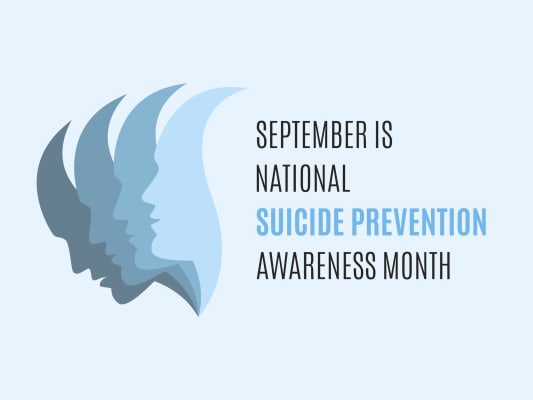Suicide: The Risks and Impact

Throughout this COVID-19 pandemic, feeling isolated, or socially disconnected from others, is common. It is also a risk for suicide.
September is Suicide Prevention Awareness Month, and Middlesex Health encourages you to take this opportunity to learn suicide warning sides and to reach out to your friends and loved ones, encouraging them to get help when needed. Also, if you’ve been directly impacted by suicide, know that there is help available for you too.
Suicide can impact anyone — from those who appear to have a lot of worries to those who are seemingly happy and appear to have everything. No one sign specifically indicates an intent for suicide. However, warning signs may include:
- Withdrawing from usual activities
- Saying they feel they are a burden on others
- Making comments about suicide or that they would be better off dead
Some individuals are at greater risk for suicide. General risk factors include:
- A history of prior suicide attempts
- Depression
- A history of bipolar disorder
- A history of substance abuse, particularly alcohol
- Age (If you are older than 55 and younger than 25, you are at greater risk.)
- Gender (Men more commonly die from suicide due to using more lethal means, but women are more likely to attempt suicide.)
- Divorce
- A family history of suicide
- A history of trauma/post traumatic stress disorder
While having a history of prior suicide attempts is a riskfactor, not having a prior history doesn’t decrease your risk.
How can you help?
If you are concerned about a loved one, ask them about suicide and listen to their response. This will not increase the risk of suicide. That is a misconception.
You can also encourage them to seek professional help, which includes outpatient mental health treatment. If you are concerned that the person is an acute risk for suicide, go to the nearest emergency department.
If guns are in their home, remove them. This has been shown to reduce suicide. Your local police department can help by taking temporary custody of any guns while a person is receiving psychiatric treatment.
For those impacted
Family, friends and neighbors are all impacted when someone commits suicide. Middlesex Health knows these individuals need support to move forward in their lives, and the Together We Heal Support Group provides just that. The support group helps those affected by the traumatic loss associated with both suicide and substance overdose in a non-judgmental environment.
The group currently meets virtually on the first Monday of every month from 5:30 p.m. to 7 p.m. It can help individuals feel connected to others who have similar experiences of loss. It can also provide a safe space for people to talk openly about these losses and the emotions they experience as a result. In addition, it can help develop a social network for people in their time of need, which is particularly helpful during this pandemic.
More Information
For information about services and resources at Middlesex Health, visit MiddlesexHealth.org. If you have any questions specifically about Together We Heal, call Ken DiCapua at 860-358-3426.
If you need immediate assistance for you or a loved one, call the National Suicide Prevention Hotline at 1-800-273-TALK.
More Stories
Healing One Tune at a Time
Middlesex Health Cancer Center offers free virtual music therapy sessions to individuals with cancer. Music therapy is the use of music or elements of music to help manage a range of conditions and improve your quality of life.
Spotlight: Men’s Health
When it comes to health care concerns that disproportionately impact men, such as heart disease and cancer, there is good news despite the grim statistics. With the help of a health care provider, many diseases are preventable.